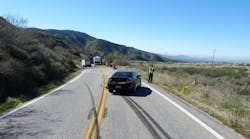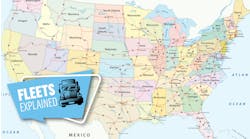Citing four major fatal motor carrier crashes it has investigated over the past year, the National Transportation Safety Board Nov. 7 said its findings “raise serious questions about the oversight of motor carrier operations,” and it recommended that the Dept. of Transportation audit FMCSA’s compliance review processes and the effectiveness of the agency’s focused compliance reviews.
The four accidents – two involving commercial trucks and two involving motorcoaches – resulted in 25 deaths and 83 injuries.
The board’s recommendations also emphasize the urgency for the Obama Administration to accelerate efforts to mandate electronic logging devices and to improve the Compliance, Safety, Accountability program, the American Trucking Assns. (ATA) said.
“In each accident, investigators identified safety deficiencies and noted red flags that had been present prior to the crashes but were unnoticed or were not acted upon by FMCSA regulators until after the crashes,” NTSB said.
“While FMCSA deserves recognition for putting bad operators out of business, they need to crack down before crashes occur, not just after high-visibility events,” said NTSB Chairman Deborah Hersman. “Our investigators found, that in many cases, the poor performing company was on FMCSA’s radar for violations, but was allowed to continue operating and was not scrutinized closely until they had deadly crashes.”
The NTSB identified problems with the thoroughness and quality of FMCSA’s compliance reviews and the agency’s increasing reliance on focused compliance reviews, which examine only a limited portion of the commercial operation.
In a prepared statement responding to NTSB's recommendation, FMCSA noted that in the past three years it had more than tripled the number of unsafe companies and drivers it has taken off the road through more comprehensive investigations and has brought together key safety, industry and enforcement organizations to help in the effort.
"We are continuously looking for new ways to make our investigation methods even more effective so we shut down unsafe companies before a crash occurs and will thoroughly review the NTSB’s findings," FMCSA said.
FMCA noted that in 2012 it issued 47 “imminent hazard” orders shutting down bus and truck carriers compared to 10 in 2011. In 2013, the agency has issued 26 out-of-service orders against bus companies and revoked the operating authority of another 25 bus companies that received unsatisfactory safety ratings following compliance reviews. FMCSA also has issued 11 imminent hazard orders shutting down trucking companies and declared seven commercial driver’s license holders as imminent hazards, barring them from driving in interstate commerce.
Along with the recommendations, NTSB released the investigative dockets from each of the four commercial vehicle accidents:
- Pendleton Ore., on Dec. 30, 2012, involving a motorcoach operated by Canadian carrier Mi Joo Tour & Travel; nine fatalities; 38 injuries.
- San Bernardino, Calif., on Feb. 3, 2013, involving a motorcoach, operated by the Mexican-owned motor carrier Scapadas Magicas; seven fatalities; 33 injuries
- Elizabethtown, Ky., on March 2, 2013, involving a commercial truck operated by Troy, Mich.-based Highway Star; six fatalities
- Murfreesboro, Tenn., on June 13, 2013, involving a commercial truck operated by Louisville, Ky.-based H&O Transport; two fatalities; six injuries
Electronic logs would address one of NTSB’s major concerns, said Bill Graves, ATA president and CEO. “ATA is a strong believer that electronic logging would go a long way toward improving hours-of-service compliance,” Graves said. “NTSB’s finding that a truck driver in a fatal crash, and many of his co-workers, routinely carried two log books is unacceptable and would have been prevented by the use of a mandatory electronic logging device. This individual chose to violate the rules, irrespective of what they were, and was able to do so by falsifying his logs. An electronic logging device will prevent drivers from disguising such violations in the future.”
NTSB’s recommendations also point out the need for FMCSA to use its limited resources better to focus on problem carriers, ATA said.
“FMCSA must improve its CSA program to better identify carriers more likely to be involved in future crashes,” said ATA Chairman Phil Byrd, president of Charleston, S.C.-based Bulldog Hiway Express. “We look forward to the forthcoming Government Accountability Office and DOT Inspector General CSA audit reports and hope they emphasize the need to ensure that the program accurately measures crash risk and focuses on unsafe fleets.”
"Safety is our top priority, and we are very proud of FMCSA’s aggressive efforts to take unsafe truck and bus companies off the road, including issuing a record number of imminent hazard orders this year," a DOT spokesperson said. "That said, there is always more we can do to improve safety and we will carefully review the NTSB’s recommendations."



